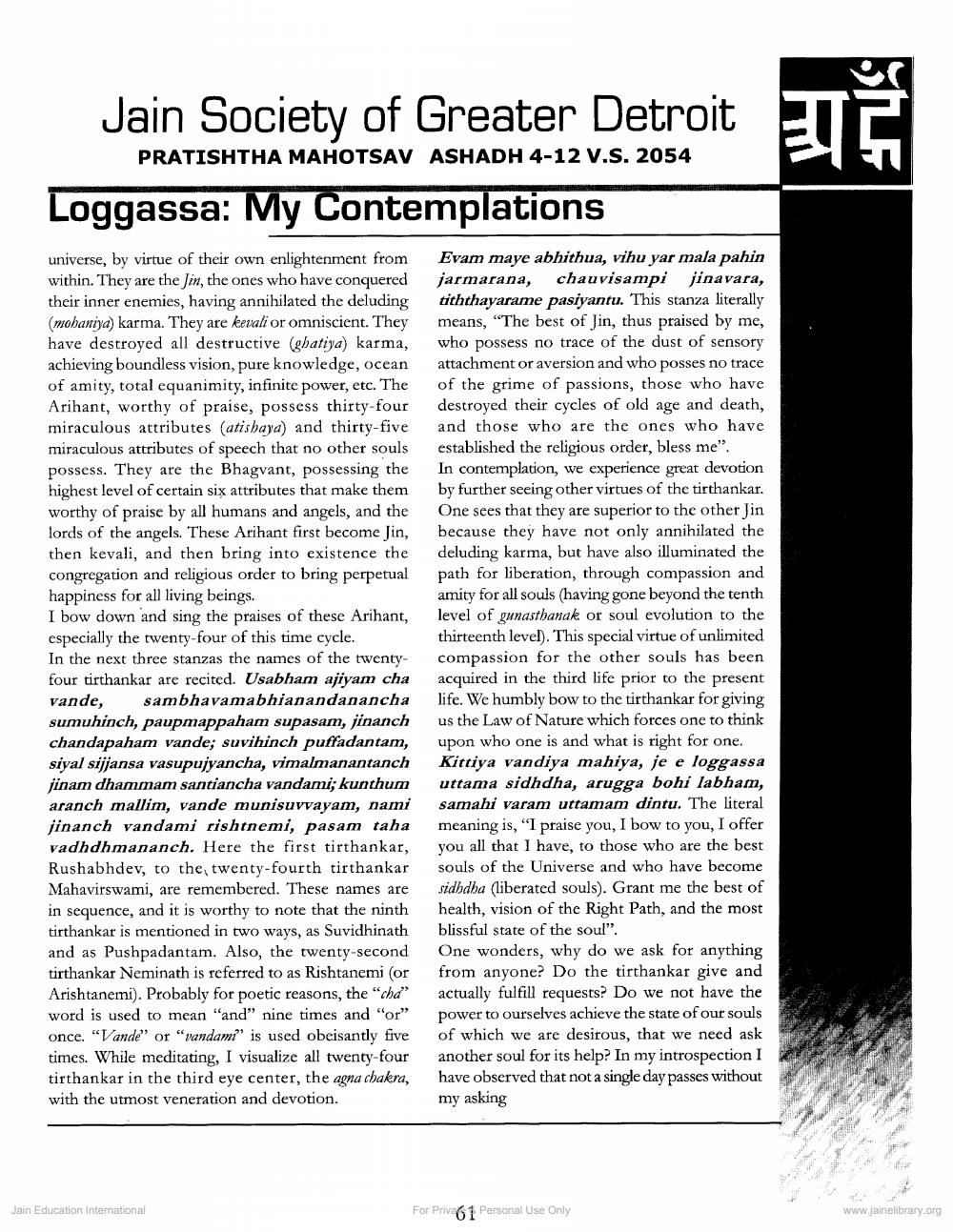________________
Jain Society of Greater Detroit
PRATISHTHA MAHOTSAV ASHADH 4-12 V.S. 2054 Loggassa: My Contemplations
L
O
REMIUM
universe, by virtue of their own enlightenment from within. They are the Jin, the ones who have conquered their inner enemies, having annihilated the deluding (mobaniya) karma. They are kevali or omniscient. They have destroyed all destructive (ghatiya) karma, achieving boundless vision, pure knowledge, ocean of amity, total equanimity, infinite power, etc. The Arihant, worthy of praise, possess thirty-four miraculous attributes (atishaya) and thirty-five miraculous attributes of speech that no other souls possess. They are the Bhagvant, possessing the highest level of certain six attributes that make them worthy of praise by all humans and angels, and the lords of the angels. These Arihant first become Jin, then kevali, and then bring into existence the congregation and religious order to bring perpetual happiness for all living beings. I bow down and sing the praises of these Arihant, especially the twenty-four of this time cycle. In the next three stanzas the names of the twentyfour tirthankar are recited. Usabham ajiyam cha vande, sambhavamabhianandanancha sumuhinch, paupmappaham supasam, jinanch chandapaham vande; suvihinch puffadantam, siyal sijjansa vasupujyancha, vimalmanantanch jinam dhammam santiancha vandami; kunthum aranch mallim, vande munisuvvayam, nami jinanch vandami rishtnemi, pasam taha vadhdhmananch. Here the first tirthankar, Rushabhdev, to the twenty-fourth tirthankar Mahavirswami, are remembered. These names are in sequence, and it is worthy to note that the ninth tirthankar is mentioned in two ways, as Suvidhinath and as Pushpadantam. Also, the twenty-second tirthankar Neminath is referred to as Rishtanemi (or Arishtanemi). Probably for poetic reasons, the "cha" word is used to mean "and" nine times and "or" once. "Vande" or "vandami" is used obeisantly five times. While meditating, I visualize all twenty-four tirthankar in the third eye center, the agna chakra, with the utmost veneration and devotion.
Evam maye abhithua, vihu yar mala pahin jarmarana, chauvisampi jinavara, tiththayarame pasiyantu. This stanza literally means, “The best of Jin, thus praised by me, who possess no trace of the dust of sensory attachment or aversion and who posses no trace of the grime of passions, those who have destroyed their cycles of old age and death, and those who are the ones who have established the religious order, bless me". In contemplation, we experience great devotion by further seeing other virtues of the tirthankar. One sees that they are superior to the other Jin because they have not only annihilated the deluding karma, but have also illuminated the path for liberation, through compassion and amity for all souls (having gone beyond the tenth level of gunasthanak or soul evolution to the thirteenth level). This special virtue of unlimited compassion for the other souls has been acquired in the third life prior to the present life. We humbly bow to the tirthankar for giving us the Law of Nature which forces one to think upon who one is and what is right for one. Kittiya vandiya mahiya, je e loggassa uttama sidhdha, arugga bohi labham, samahi varam uttamam dintu. The literal meaning is, "I praise you, I bow to you, I offer you all that I have, to those who are the best souls of the Universe and who have become sidhdha (liberated souls). Grant me the best of health, vision of the Right Path, and the most blissful state of the soul". One wonders, why do we ask for anything from anyone? Do the tirthankar give and actually fulfill requests? Do we not have the power to ourselves achieve the state of our souls of which we are desirous, that we need ask another soul for its help? In my introspection I have observed that not a single day passes without my asking
Jain Education Intemational
For Priva61 Personal Use Only
www.jainelibrary.org




